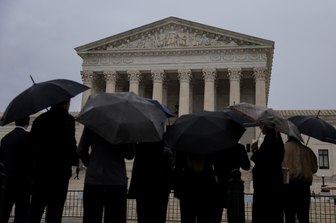Most Americans are at least somewhat satisfied with the way things are going in their own lives. But only 16% are very satisfied, according to the latest Economist/YouGov Poll.
How satisfied Americans say they are with their lives relates to how much money they earn. The higher their family income, the more satisfied a person reports themselves to be.
This is also true of particular kinds of life satisfaction: Americans' satisfaction with their finances, their health, and the state of their personal relationships. All are higher with higher family income.
Their political identity also affects Americans' satisfaction in a way it didn't used to. Democrats express more satisfaction with the way things are going in their lives than Republicans or Independents do (the poll asked about satisfaction before asking about politics). In December 2009, the year Barack Obama became president, there was little difference in how Democrats and Republicans described their satisfaction with their own lives, according to a CBS News poll: 74% of Democrats and 73% of Republicans said they were completely or somewhat satisfied.
Similar partisan gaps emerge on the latest poll for other measures of feelings about life. Democrats are 9 percentage points more likely than Republicans to say they have felt “hopeful” recently (51% vs. 42%). Majorities of Republicans (56%) and Independents (61%) say they have felt “frustrated,” something less than half of Democrats (44%) say.
Income remains a factor: 62% of Americans with annual family incomes of $50,000 or more say they have felt happy, compared to only 49% of Americans with lower family incomes.
Which is more important now for life satisfaction — income or political party? At every family income level, Democrats are more likely than Republicans to report being satisfied with how things are going in their life today. The partisan gap is especially large among Americans in the income group of three with the lowest income (a 20-point gap in the Democrats’ favor) and among those with the highest family income level (a 19-point gap).
There are fewer party differences when it comes to evaluations of long-term relationships: More than 80% of Democrats and a similar share of Republicans currently in a relationship say they are happy in that relationship, though Republicans are 8 points more likely to say they are very happy.
There is relatively little partisan difference when it comes to stating the details of a person’s financial situation, but party affects perceptions of how things are going and what has happened historically to a person’s finances. Republicans are just 6 points less likely than Democrats to say they expect their family income to increase in 2024, but they are 26 points more likely to say their family’s financial situation has gotten worse in the last five years.
See the toplines and crosstabs from the Economist/YouGov poll conducted on October 8 - 10, 2023 among 1,500 U.S. adult citizens.
Methodology: Respondents were selected from YouGov’s opt-in panel using sample matching. A random sample (stratified by gender, age, race, education, geographic region, and voter registration) was selected from the 2019 American Community Survey. The sample was weighted according to gender, age, race, education, 2020 election turnout and presidential vote, baseline party identification, and current voter registration status. Demographic weighting targets come from the 2019 American Community Survey. Baseline party identification is the respondent’s most recent answer given prior to November 1, 2022, and is weighted to the estimated distribution at that time (33% Democratic, 31% Republican). The margin of error for the overall sample is approximately 3%.
Image: Adobe Stock (bilanol)









